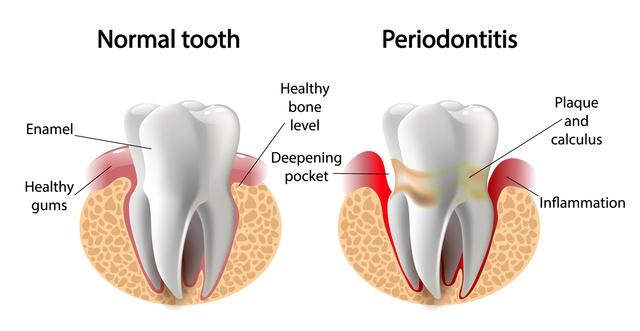
Problems with Gum Disease? Inside the Smile of Oak Lawn can Help
As an experienced Oak Lawn IL dentist, we belive excellent oral health starts with gum care, but it is often the first thing that gets overlooked. This can lead to unsightly teeth and gums, bacterial growth, infections and eventually…gum disease.
It’s important to understand how your gums play a part in the health of your mouth. Plaque buildup eventually leads to receding gum lines, bone loss, and even tooth loss in severe cases.
Gum disease is painless during its early stages so issues can go undetected until it becomes too late. If proper hygiene techniques are utilized early, the damage caused by the gum disease, Gingivitis, is reversible.
Daily brushing and flossing and regular visits to the dentist help to keep plaque and bacteria at bay and keep your gums healthy and happy.

Symptoms
Gum disease, or periodontal disease, is inflammation of the gums. If left untreated, it can progress to the point of affecting the bone that surrounds the teeth and provides it with support.
Gum disease is caused by the bacteria found in plaque. Plaque is the sticky, colorless film that is always forming on the surface of your teeth. Daily brushing and flossing keeps plaque at bay.
The bacteria in plaque can infect your gum, teeth and jaw bone. This will eventually cause them to become loose, fall out or have to be extracted by a dentist.

Stages of Gum Disease
Gingivitis: The earliest form of gum disease; it is the result of plaque buildup at the gum line. Plaque should be removed through daily brushing and flossing practices. Poor daily oral hygiene allows plaque to build up and produce bacteria which irritates the gum tissues. If you have noticed some bleeding when you brush and floss, you likely have Gingivitis. Luckily, the damage in this stage can be reversed. The bone and connective tissue holding the teeth in place have not yet been impacted.
Periodontitis: By this point, there has been irreversible damage done to the bone and fibers that are holding the teeth in place. Pockets below the gum line may start to form, which trap food and plaque. With proper dental care, further damage can be prevented. It’s also important that home care practices be drastically improved.
Advanced Periodontitis: This is the final stage of gum disease. The bone supporting the teeth has been destroyed to the point that the teeth have loosened from their sockets. Aggressive treatment is needed, but will not guarantee that your teeth can be saved. More often than not, the teeth will have to be removed.
Do you Have Gum Disease?
As it typically results from poor oral hygiene, gum disease may occur at any age. It is most common among adults. Again, if detected early enough, gum disease is completely reversible. Schedule an appointment with your dentist as soon as possible if you begin to notice any of the following symptoms:
- Gums that bleed when you floss or brush.
- Changes in the way your teeth fit together or meet when you bite or chew.
- Teeth that have an elongated look due to a receding gum line.
- Gums that appear red, puffy or swollen.
- Painful or tender gums.
- Pockets formed by gums that have pulled away or separated from the teeth.
- The appearance of pus between your teeth and gums.
- Chronic bad breath or a bad taste in your mouth despite brushing, flossing or using mouthwash.
What is the Treatment Like?
The early stages of gum disease can often be reversed with proper brushing and flossing. Good oral health will help keep plaque from building up.
Plaque hardens over time and becomes dental tartar. At this point, a professional deep cleaning by your dentist or dental hygienist is the only way to remove it. Your dental professional will scale your teeth to remove the tartar that sits above and below the gum line.
For more severe cases, a root planing procedure may need to be done. This procedure helps to smooth the abnormalities that have developed on the root of the teeth. This is important because it makes it more difficult for plaque to be deposited in those areas.
Early gum disease can be reversed through routine daily brushing and flossing practices. If you’ve reached a more advanced stage of gum disease, treatment in the dental office is necessary to prevent tooth loss. Sometimes, the only option is to remove the tooth.
Dr. Mike has treated many of your neighbors, and will see what course of treatment is best for your condition. Our goal is to help you keep your teeth for the rest of your life!
Don’t Delay, Call Us Today!
Gum disease can cause issues ranging from pain and discomfort to unsightly changes in your bite and smile. Over time, gum disease can cause your teeth to shift and become loose. If your gum disease has reached the advanced stage, tooth extraction may be necessary to restore your oral health.
